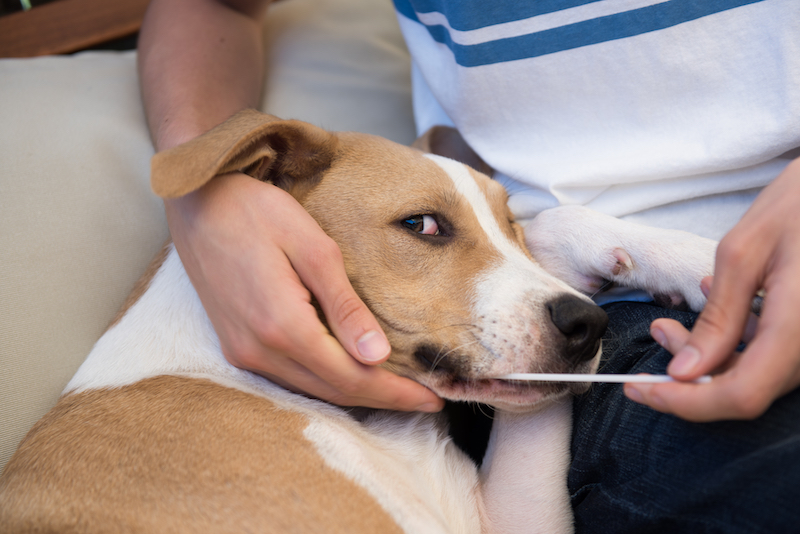What is a Mutt Dog?
A comprehensive look at these loveable dogs.

A comprehensive look at these loveable dogs.

When pet parents say “I have a mutt,” they’re generally referring to a pooch that’s a blend of multiple breeds.
Mutts can make a great addition to your fur fam, but you might have questions. What do you get when you cross a Border Collie, Chihuahua, Corgi, and Pit Bull? And if my mutt is “a little bit of everything,” is there a way to figure out which breeds contributed to their family tree?
It’s important to note that mutts generally have fewer health issues than purebred dogs. That’s good news for pet parents looking to give their furry friend a long, vibrant life—hopefully with fewer vet bills along the way.
Unlike purebred dogs, a mutt dog is made up of a combination of two or more different breeds. Their lineage is often unknown or varied.
Mutts can be a great choice for first-time dog owners, and can also make great service dogs.
Mutts are generally considered healthier than purebred dogs. This is mainly based on the concept of “hybrid vigor”—aka heterosis and crossbred vigor (don’t worry, you won’t be tested on this later).
“Mutts have mixed genetics, so it’s less likely that they’ll have recessive genes. This makes it less likely that they’ll have breed-specific genetic conditions—like hip dysplasia, or allergies—but it’s not impossible. On the flip side, some purebred dogs are closely inbred, and that can lead to a more negative genetic profile” – Dr. Stephanie Liff
The idea is that mutts are often less prone to certain breed-specific health issues because of their more diverse gene pool. Because of selective breeding and inbreeding, purebred dogs tend to have a higher likelihood of genetic disorders.

Mutts, mixed breed dogs, and designer dogs are all a result of crossing different breeds. All three terms are sometimes used interchangeably, but there are slight nuances.
Usually refers to a dog with an unknown ancestry or mix of various breeds. Their breed makeup is usually incredibly varied due to multiple generations of mixed breeding.
These pups can have parents from two known, different breeds, but are not bred intentionally. They also usually have a more recent lineage than mutts.
These dogs are intentional crossbreeds created by breeders. They usually are a combination of two purebred dogs of different breeds, like a Poodle and a Labrador, which results in a Labradoodle. This popular designer dog was initially bred to create a guide dog that was hypoallergenic (like a Poodle), with a Lab’s friendly personality.
Other popular examples of designer dogs include:
There’s a charming unpredictability about mutts, as they can inherit genetic traits from either or both parents. And if their parents (and grandparents) are also mutts, these pups can really be a wonderfully mixed bag.
This wide genetic variety can lead to a diverse range of a dog’s key characteristics—including their appearance and temperament.
Keep in mind that the exact characteristics of a mutt can be unpredictable and will also be influenced by factors beyond genetics, such as the pup’s socialization, training, and environment.

If you’re looking to track down your mutt’s makeup, one increasingly common way is through DNA tests. Dog DNA tests can provide insights into a dog’s breed make up (similar to ones for humans).
Some of the top dog DNA test kit brands on the market include Embark and Wisdom Panel.
These tests usually use a sample from a cheek swab to help identify the different breeds within your pooch’s ancestry, even going back several generations.
Not only can DNA tests help you understand your mutt’s breed composition, but they can also provide valuable information about potential breed-specific health issues. But keep in mind: Even if your mutt’s DNA test results suggest your pup will be more prone to certain issues, it doesn’t necessarily mean that will be the case.
Don’t forget that these tests aren’t 100% accurate, and there’s a lot more to your mutt than their genetics. Each dog is unique, and their environment, training, and socialization experiences also play a significant role in shaping their behavior and personality.
No matter their lineage, every dog deserves a loving home. You can often find mutts and mixed-breed dogs at reputable shelters and rescue organizations.
You can expect a lot of new costs when you adopt any pup—like adoption fees, vet visits, food, grooming, bedding, toys, and other essential supplies.
Buying dog insurance early in your mutt’s life is a smart (and responsible) move to help you cover the costs of their health care. And at Lemonade, you can cover your dog from as early as two months old.
Learn more about what a Lemonade Pet policy covers here. For example, a basic policy can help cover the costs of diagnostics (like x-rays or blood tests) and treatments (like surgery or medication) for eligible accidents and illnesses.
You have the power to customize your mutt’s policy with preventative care and add-on coverages to meet their needs, and your budget.
Click below to get your quote started.
A few quick words, because we <3 our lawyers: This post is general in nature, and any statement in it doesn’t alter the terms, conditions, exclusions, or limitations of policies issued by Lemonade, which differ according to your state of residence. You’re encouraged to discuss your specific circumstances with your own professional advisors. The purpose of this post is merely to provide you with info and insights you can use to make such discussions more productive! Naturally, all comments by, or references to, third parties represent their own views, and Lemonade assumes no responsibility for them. Coverage and discounts may not be available in all states.
Please note: Lemonade articles and other editorial content are meant for educational purposes only, and should not be relied upon instead of professional legal, insurance or financial advice. The content of these educational articles does not alter the terms, conditions, exclusions, or limitations of policies issued by Lemonade, which differ according to your state of residence. While we regularly review previously published content to ensure it is accurate and up-to-date, there may be instances in which legal conditions or policy details have changed since publication. Any hypothetical examples used in Lemonade editorial content are purely expositional. Hypothetical examples do not alter or bind Lemonade to any application of your insurance policy to the particular facts and circumstances of any actual claim.